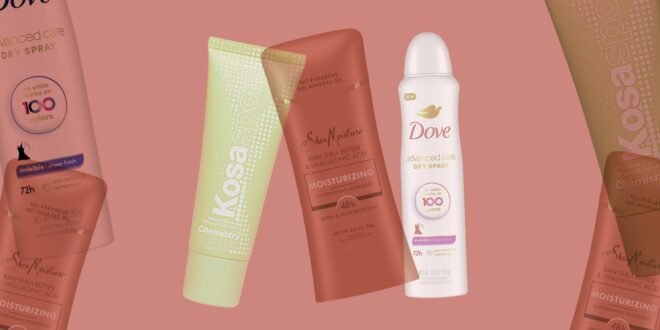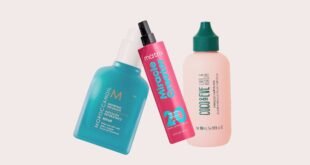Editor’s tip: You can get this deodorant in the iconic Glossier You scent, which you may already have as a perfume. What better way to round out your signature fragrance?
Key ingredients: coconut oil, elderberry extract, magnesium hydroxide, potato starch | Aluminum-free: yes | Scent: 4 scent options (Sandstone, Glossier You, Orange Blossom Neroli, Unscented)
Frequently Asked Questions
What are antiperspirants?
“Traditional antiperspirants do not decrease sweating, but rather block sweat from reaching the skin’s surface,” says Joshua Zeichner, MD, a board-certified dermatologist in New York City. The various versions of aluminum compounds you may find as the active ingredient in antiperspirants are what do the sweat-blocking.
These include aluminum chlorohydrate, aluminium zirconium, aluminum chloride, and aluminum zirconium tetrachlorohydrex gly, which serve a unified purpose. “All aluminum ingredients in antiperspirant products work to control wetness by forming a temporary plug within the sweat gland,” cosmetic chemist Ron Robinson tells Allure.
What are deodorants?
Not all deodorants are antiperspirants, but most antiperspirants are deodorants. Deodorant is considered a cosmetic because, as Shereene Idriss, MD, a board-certified dermatologist based in New York City, previously explained, it’s formulated with antimicrobial agents to inhibit the growth of microorganisms in the armpits.
But sweat itself isn’t what makes you stink. “Odor is released when bacteria come into contact with the thicker, milkier substance produced by apocrine glands in our armpits and groin,” she added—feet and butts included. While dermatologists say daily bathing is critical to combatting body odor, deodorant can still be very useful. “It is helpful to use deodorant in the areas of skin-on-skin contact, like under heavier breasts or stomach, to prevent skin maceration during high humid seasons or to prevent skin irritation from friction,” Julie E. Russak, MD, a board-certified dermatologist at Mount Sinai Hospital in NYC, told Allure.
Are aluminum deodorants safe?
The safety of aluminum as an antiperspirant ingredient has been called into question by clean beauty advocates and natural ingredient enthusiasts. Some believe aluminum can contribute to the development of diseases like breast cancer and Alzheimer’s, but there isn’t enough scientific evidence to support those claims.
“We rely on studies done on thousands of women to see if there are links to breast cancer and the suspected culprit,” Sarah Cate, MD, a board-certified breast surgeon and an assistant professor of surgery and breast cancer specialist at Mount Sinai in New York City, told Allure. Ultimately, no one has developed breast cancer as a result of using antiperspirants.
 Info Malang Raya Its All About World News
Info Malang Raya Its All About World News




